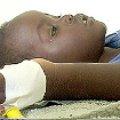The Swiss drug company Novartis, in conjunction with Geneva-based non-profit Medicines for Malaria Venture, launched a new version of the anti-malarial drug Coartem at a conference in Dakar.
As the promotional video for the drug explains, the new medicine, tested in conjunction with the Tanzanian Ministry of Health, has been proven as effective as the previous version, but has been given a new child-friendly flavor, and can be administered in child-size doses.
The drug comes in tablets, which are dissolved in a small amount of water, becoming a fruit flavored drink. Children often refused the previous version because of its bitter taste.
Malaria continues to be one of Africa's most deadly diseases for children, responsible for nearly twenty percent of deaths of children under the age of five, according to UNICEF. Gianfranco Rotigliano, UNICEF's director for West and Central Africa, says malaria is still ubiquitous in Africa, and though adults develop antibodies to the infection, children under five are especially vulnerable. He says that while the child-friendly medicine is an advance, a coordinated effort in administering the drug properly will be just as important.
Experts say new campaigns, including the launch of the child-friendly Coartem, are being monitored closely by health officials. Children must complete a three-day course of the drug to be fully cured. Though the child is likely to feel better after the first day of treatment, the disease is likely to return and even worsen if the full course is not completed. Novartis says they going to great lengths, alongside health officials, to educate the public and health workers about the proper use of the drug.
Senegal's Minister of Health Safiatou Thiam Sy says the stakes are high in Senegal as well as the rest of Africa. Thiam Sy says malaria weighs heavily upon not only the health of the region, but also its productivity and economic development. Treating malaria in children, she says, is key to the development of Senegal and Africa as a whole.
UNICEF estimates that malaria may negatively effect economic growth by 1.3 percent of annual gross domestic product in the hardest hit Sub-Saharan African countries. The organization says the key to fighting the disease is a combination of programs including wider usage of bed nettings and a more effective distribution system for medicines.
By Brent Latham Dakar 20 February 2009

